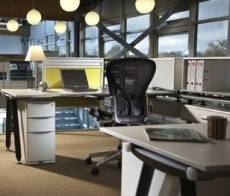July 25, 2014
We may not know what the future holds, but we can certainly be prepared for it
 Given the track record of people when it comes to making predictions about the future, it’s easy to grow cynical, especially when it involves a profession as subject to the vagaries of technological and cultural change as facilities management. But while we should be wary of more fanciful and long term thinking, any natural scepticism shouldn’t blind us to those predictions that we know will largely come true, especially those based on what we know is happening already. For example, recent research carried out by Cass Business School and Henley Business School and presented in the book Future Work: How Businesses Can Adapt and Thrive in the New World of Work found that two-thirds of managers believe there would be a revolution in working practices over the coming ten years. Given what we’ve seen over the past ten years, it’s impossible to argue any different. In fact the only quibble we should have with this is that it won’t take another ten years for this to happen because the process is already well underway.
Given the track record of people when it comes to making predictions about the future, it’s easy to grow cynical, especially when it involves a profession as subject to the vagaries of technological and cultural change as facilities management. But while we should be wary of more fanciful and long term thinking, any natural scepticism shouldn’t blind us to those predictions that we know will largely come true, especially those based on what we know is happening already. For example, recent research carried out by Cass Business School and Henley Business School and presented in the book Future Work: How Businesses Can Adapt and Thrive in the New World of Work found that two-thirds of managers believe there would be a revolution in working practices over the coming ten years. Given what we’ve seen over the past ten years, it’s impossible to argue any different. In fact the only quibble we should have with this is that it won’t take another ten years for this to happen because the process is already well underway.





 The world of work and the workplace is always changing. We know it. You know it. In fact, there are a whole host of people that know it, but depending on what side of the professional fence you sit on, you might approach it in different ways, looking through a different lens or with a specific focus. Or are you already bridging the professional gap? Workplace change and the numerous ramifications of it are well documented. In a world that is changing, at frightening pace, it is strange to think that many of the ways in which we work are so entrenched in 20th century thinking. We need to break away from this and outline what the future is going to look like and how we should adapt. Or do we already have the answers? This ground is well trodden. However, it could be time to reassess our thinking and the way we approach this challenge, ensuring it becomes the norm for organisations around the world.
The world of work and the workplace is always changing. We know it. You know it. In fact, there are a whole host of people that know it, but depending on what side of the professional fence you sit on, you might approach it in different ways, looking through a different lens or with a specific focus. Or are you already bridging the professional gap? Workplace change and the numerous ramifications of it are well documented. In a world that is changing, at frightening pace, it is strange to think that many of the ways in which we work are so entrenched in 20th century thinking. We need to break away from this and outline what the future is going to look like and how we should adapt. Or do we already have the answers? This ground is well trodden. However, it could be time to reassess our thinking and the way we approach this challenge, ensuring it becomes the norm for organisations around the world.
 There is now an unstoppable energy for radical change in the way that companies of all sizes conduct their Corporate Social Responsibility duties. There are compelling economic and social reasons for companies to construct new ways of thinking and practice around CSR that go way beyond just doing something worthy or nice, from building effective partnerships to attracting top employees. Some companies prefer terms like ‘corporate responsibility’, ‘corporate conscience’, ‘corporate citizenship’, ‘social performance’, ‘sustainability’ or even ‘future-proofing’ over CSR. But the core CSR principles are that a business voluntarily commits to embracing responsibility for its actions and to impacting positively on the environment, on society and on consumers, employees and other stakeholders.
There is now an unstoppable energy for radical change in the way that companies of all sizes conduct their Corporate Social Responsibility duties. There are compelling economic and social reasons for companies to construct new ways of thinking and practice around CSR that go way beyond just doing something worthy or nice, from building effective partnerships to attracting top employees. Some companies prefer terms like ‘corporate responsibility’, ‘corporate conscience’, ‘corporate citizenship’, ‘social performance’, ‘sustainability’ or even ‘future-proofing’ over CSR. But the core CSR principles are that a business voluntarily commits to embracing responsibility for its actions and to impacting positively on the environment, on society and on consumers, employees and other stakeholders. 













September 5, 2014
Workplace design is increasingly interwoven with the dynamics of the city
by Colin Watson • Comment, Facilities management, Workplace design
(more…)